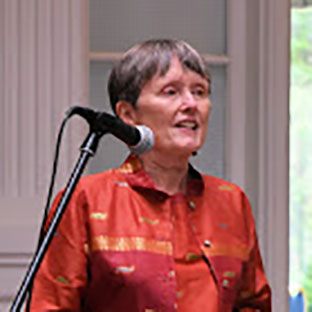On 16 June 2020, an online RSA event on the future of inclusive employment was joined by over 60 people from the UK, US and beyond. RSA Fellows Ben Harvey and Liz Sayce OBE summarise the wide-ranging discussion – which involved disabled people, academics, policy analysts, trade unionists, service providers and allies – into 10 key points for employers, local agencies and government.
After big crises – from world wars to pandemics – big shifts in policy often occur. If these shifts are to avoid the risks facing disabled people’s future employment and economic prospects, they need to prioritise the creation of inclusive employment. Disabled people face three particular risks: the impact of Covid-19 on particular jobs, sectors and groups of workers; the unequal impacts of recession on different people and areas; and longer-term trends of automation and robotics.
The event, chaired by Liz Sayce (Visiting Senior Fellow at London School of Economics), , discussed how to seize opportunities and avoid entrenching inequalities, and involved four speakers: Lela Kogbara, Chair of Health and Employment Partnerships; Gail Tong, Alumni of Disability Rights UK’s Leadership Academy Programme (and Equality Engagement Officer in the Insight and Engagement Team, Hampshire County Council Staff Networks); Shane Kanady FRSA, Vice President of Workforce Development for SourceAmerica; and Professor Melanie Jones, Cardiff Business School.
Action for Employers
The discussion identified three key actions that employers can take. First, implement fair retention. If redundancies are needed, use an equalities lens to ensure no disproportionate impact on particular groups, including no unfair treatment of those ‘shielding’ or at risk from Covid-19, or living with someone who is.
Second, build new learning on flexible working into business as usual. Take the best of flexing how, when and where people work, extend use of accessible technology – such as captioned video conferencing, accessible websites and links – but do not impose (for instance) blanket home working. Melanie Jones and disability@work colleagues argue home working should be voluntary; at the least there should be a negotiation, based on respecting rights to working adjustments. Home working can work brilliantly but for some it intensifies isolation, and if colleagues cease to work at home post-Covid-19, it may leave those at home feeling excluded. Shane Kanady added that accessibility and usability are both critical to ensure persons with disabilities can take full advantage of the potential technology offers.
Third, sustain and build on known good practice, including accountability for progress. Gail Tong described the power of peer support both within her Disability Staff Network and through joint work with BAME and LGBTQ networks. Melanie Jones argued employers should understand their disabled workforce and measure the impact that decisions and practices have on them. Evidence shows systemic approaches with accountability – at all levels of management and the board – for progress on equality makes more difference than, for instance, isolated training courses. Participant Professor Nick Bacon told us training has a marginal effect if voluntary and no effect if mandatory. Online training is generally as effective as face-to-face training.
Local agency priorities
Likewise, the discussions identified three areas of action that should be taken by local agencies, including local authorities, public services and NGOs. First, take the opportunity of local economic recovery plans to build in inclusion from the outset. Lela Kogbara noted that UK local authorities are creating these plans now and some participants named areas where inclusion is a stated aim and where disabled people’s organisations could contribute, with sharing of good practice between areas.
Second, foster partnerships between disabled people’s organisations, companies, local authorities, health services, skills agencies and others. Shane Kanady talked of the importance of partnerships to make tangible progress. Participants called for a more joined up approach between education and employment support providers to enable young disabled people to make the transition to work, and for ‘anchor institutions’ like local authorities to be leaders as inclusive employers, contractors and partners. Finally, local agencies should set employment as a health outcome, withLela Kogbara highlighting the fact that the evidence shows good employment benefits people’s health.
Government must lead
Employers and local agencies alone cannot make the differences needed and central government must lead the way. The participants identified a range of policy areas where positive action could be taken.
The government should require employers to report on their employment and pay of disabled people; a recommendation made by Melanie Jones and colleagues, Liz Sayce, Lord Shinkwin and others. This includes government departments and agencies and the public sector, who should set examples of good practice.
It should also use funding levers to incentivise organisations to demonstrate good practice in employing disabled people. Participants in the UK called for changes to the Social Value Act, so that contracts would be dependent on evidence of good employment outcomes or plans. Tax incentives could be explored. Shane Kanady and colleagues discussed the use of regulatory levers in the US, and argued that success in compelling direct hire by the public and private sectors or the utilisation of procurement programs that employ persons with disabilities are ultimately constrained by the behaviours of actors.
Greater investment is also needed in effective employment support and inclusive job creation. Given the challenges ahead, disabled people will need support to get back into sustainable employment. The UK policy discussion about apprenticeship guarantees and the ‘Kickstart’ programme to increase jobs for young people must be fully inclusive. On employment support, Lela Kogbara proposed individual placement and support for all disabled people, moving beyond high-volume programmes run through the Department for Work and Pensions. Participants called for resource channelled through local commissioning, with freedom to commission trusted, values-based local organisations, including small organisations, rather than just large prime providers. They also felt there was a need to increase the scope, promotion and efficiency of the Access to Work programme, for instance, dropping the requirement for ‘wet signatures’, making it less ‘clunky’ through digital process.
Finally, the government needs to ensure effective enforcement of equality law. As Lela Kogbara put it: “Some employers talk inclusion but they don’t mean it”. Employers need to know there are consequences of breaches of equality law.
Promoting change
Disabled people, the organisations that work with them and their allies hold some powerful keys to how countries can navigate rapid change and can help shape the future of inclusive employment. Between us we know what flexible, inclusive employment looks like, including for those people living with energy impairments and fluctuating mental and physical health conditions. We know the evidence and are aware of the policy options. As a participant pointed out, we need to “start with inclusion rather than adding it in”. But to be heard, participants felt that it is was important both to win hearts and minds and exert pressure. Improvements to disabled people’s lives have been fought for and, as Lela said, there are opportunities to exert pressure for equality, with allies, in the context of Black Lives Matter. Unless ableism is replaced by new narratives of inclusion and equality, the gaps between disabled and non-disabled people will widen.
These new messages of inclusion require strong and diverse voices to challenge narratives that may emerge, such as unemployment being framed as a mental health challenge needing treatment rather than a job and decent income. New narratives will also need to counter more paternalistic versions of the business case such as disabled people being more loyal, when in reality they may have just got stuck for lack of opportunity. As one participant said: “Inclusive employment is a right even if it brings no business benefits”.
The potential prize is a significant contribution to how countries navigate the challenges of unemployment and inequality they currently face. As the International Labour Organisation put it: “The perspective and life experiences of people with disabilities can help create innovative solutions to tackle the crisis and ensure a more equitable society for all… Mechanisms to promote disability inclusion contribute to a response that better serves everyone, making systems more agile and responsive to complex situations”.
RSA Fellows Ben Harvey and Liz Sayce OBE are involved in the RSA Inclusive Work, Disability and Ageing Network, which aims to further embed and progress the disability and aging lens within the ‘Future of Work’ employer and policy agendas. To continue conversations on the future of work for disabled people, join the Network.
Related articles
-
An idea worth stealing
Edward Lowe
Watching how software engineers work could revolutionise how we build products and services, and give employees more interesting and fulfilling work. Edward Lowe talks Tesla, Henry Ford and a lesson from the slaughterhouse
-
Designing work around people
Nick Bacon Mark Howard Fergus Grierson
We have inclusive design standards for buildings. Why can't we have them for work? The RSA Inclusive Work, Disability and Ageing Network Steering Group propose a system that works for everybody.
-
We need intergenerational future of work dialogue now
Bob Jeffery Farheen Khan Ashok Pandey Tim Whitaker
A radical new policy agenda is required to support multigenerational workplaces as they become the new normal.





Be the first to write a comment
Comments
Please login to post a comment or reply
Don't have an account? Click here to register.